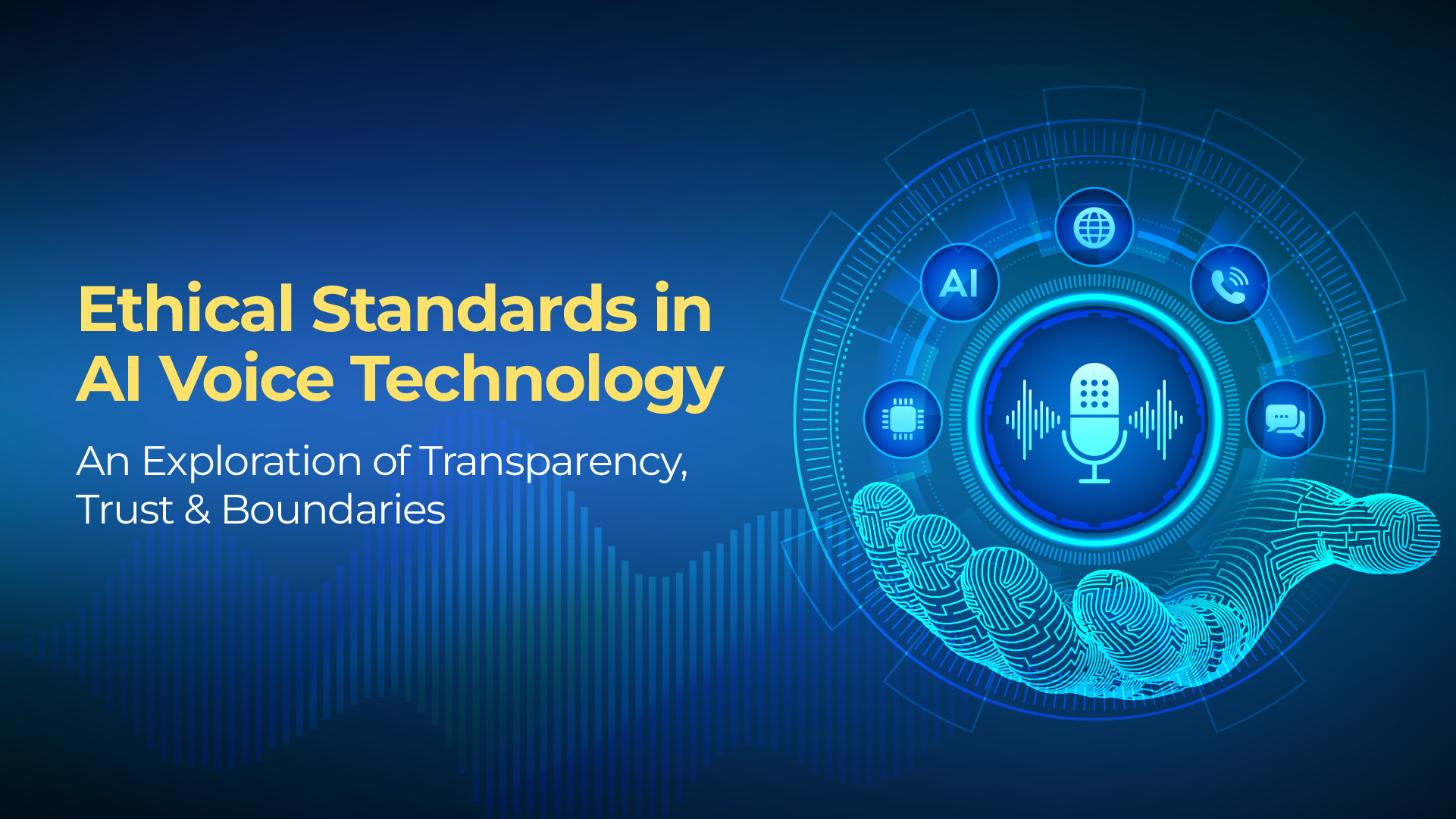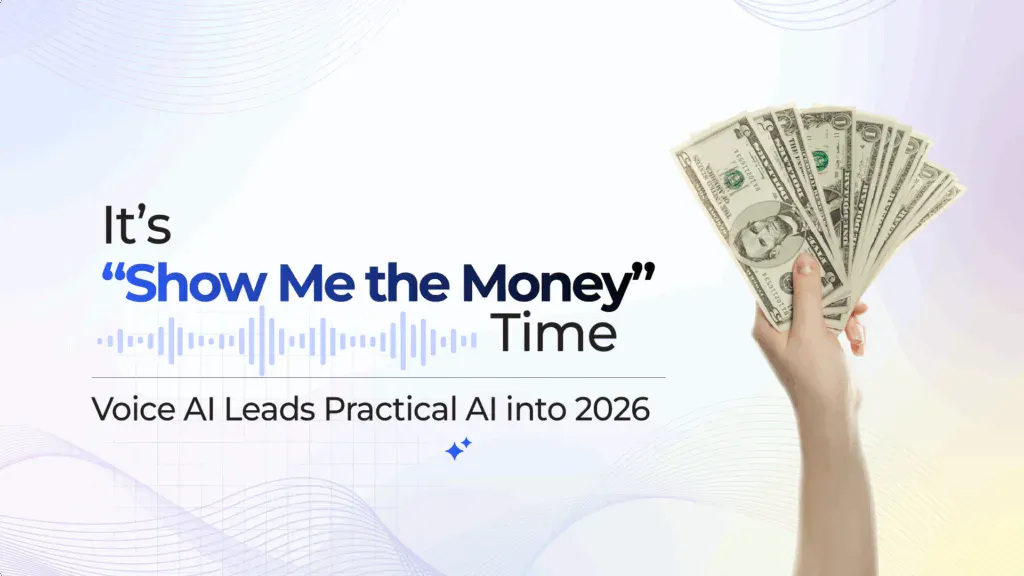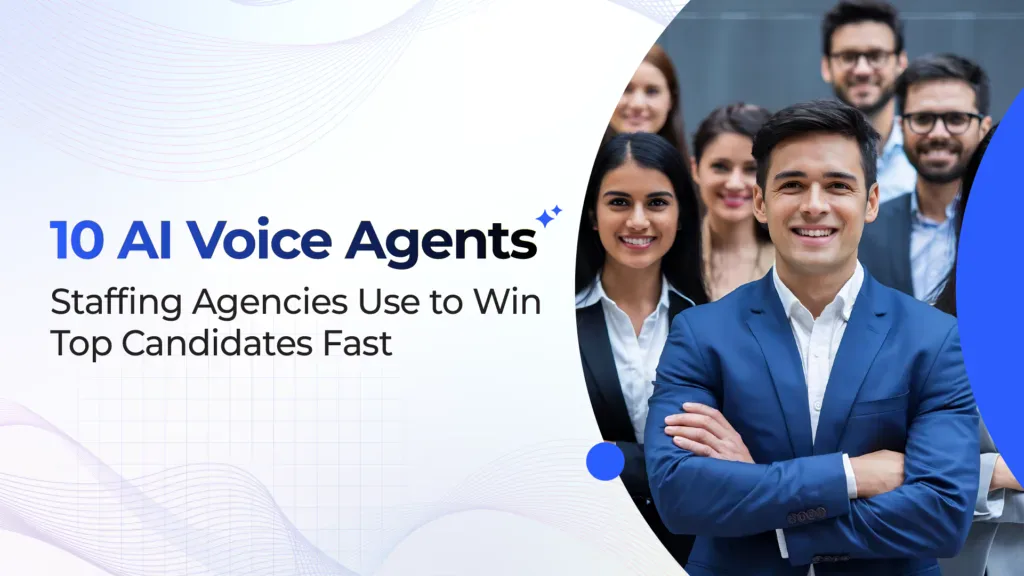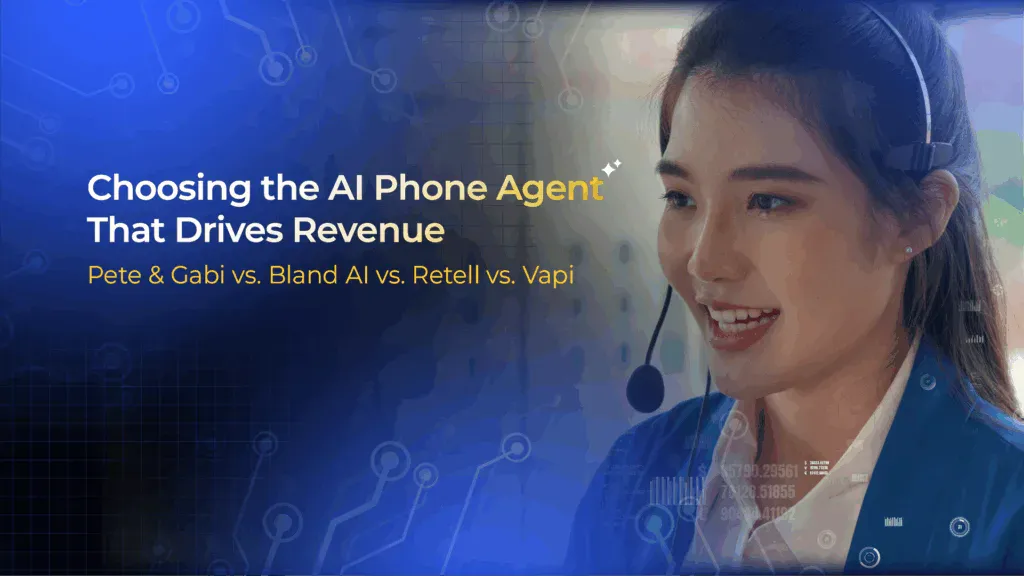Summary:
Maintaining trust is more challenging and essential than ever. With 90% of US consumers buying only from brands they trust (Capital One, 2025), and 96% saying excellent service builds that trust, it is critical for companies to ensure their AI systems are transparent, respectful, and compliant. This article explores the rising concerns around AI deception, privacy, and deepfakes, outlines regulations like the TCPA, BIPA, and the EU AI Act, and provides a checklist for businesses seeking to deploy voice AI systems responsibly.
Introduction:
No matter what your business is, trust is critical.
Most American consumers (90% per Capital One research in 2025) prefer to buy from brands they trust.
62% will pay more for an identical product from a company they trust, and 75% of consumers age 18–34 say trust is even more important than in the past.
And critical to that? Customer service, with 96% stating excellent customer service, builds trust in an organization.
So, what happens to that trust when customers can’t get through to you, don’t get called back, deal with burnt out agents, or interact with unreliable or deceptive AI?
In today’s article, we address some of AI’s most critical (and challenging) dimensions, exploring:
- Why AI-powered outreach transparency is so important
- How different regions are regulating ethical AI for voice systems
- What AI calling providers must do to ensure customer safety and trust remains high
- How Pete & Gabi was built to maintain trust, ensure compliance, and provide voice AI with the highest ethical standards
At a time when building trust in AI is both essential and often overlooked, voice system providers play a critical role in ensuring it’s done right.
Why Voice AI Ethics Matter
The truth is, most people still prefer dealing with humans, that is, provided that person is available, knowledgeable, and interested in helping.
So, with voice AI technology having improved to the extent that most people can’t tell voice AI from human in blinded tests (per University of California Berkeley, OpenAI, and ElevenLabs research), the potential for deception is significant.
Deepfake scams powered by AI have become an increasingly common form of fraud, feeding a spike in scams that’s already caused $1 trillion in annual, global losses.
Customers are wise to be suspicious of who they’re talking to.
This is why AI systems that fool people into believing they’re real are not only unethical, they’re also increasingly illegal (see below).
Consent and Concerns over Privacy
AI systems, unlike humans, have perfect recall. Some can analyze biometric data and even incorporate predictive analytics.
Visible, high-profile lawsuits involving training data, concerns over AI systems spitting back out private information, and the growing quality of AI deepfakes are leading customers to become increasingly concerned over whether their data is being handled safely and kept private.
And governments, in turn, are increasingly enacting legislation to ensure transparency and enforce a customer’s right to opt-out of data collection.
Without transparency of use and effective ethical standards, AI systems can lead to consumer anxiety and distrust.
They can also lead businesses to inadvertently break regional laws or regulations, triggering fines, damaged reputations, or even the risk of being dragged through the courts.
Current and Emerging Regulations Impacting AI Calling Technology
AI regulations vary widely and evolve rapidly, though not as fast as the technology itself.
In the US, much is currently left to individual states, and there are a variety of laws either already in place or working their way through legislatures now.
Many are aimed at bringing protection for consumers in the area of voice AI and data privacy with AI systems.
This variability can be highly challenging for companies, both for managing regional variations and in keeping up with changes.
As of now, the following regulations impact voice AI systems:
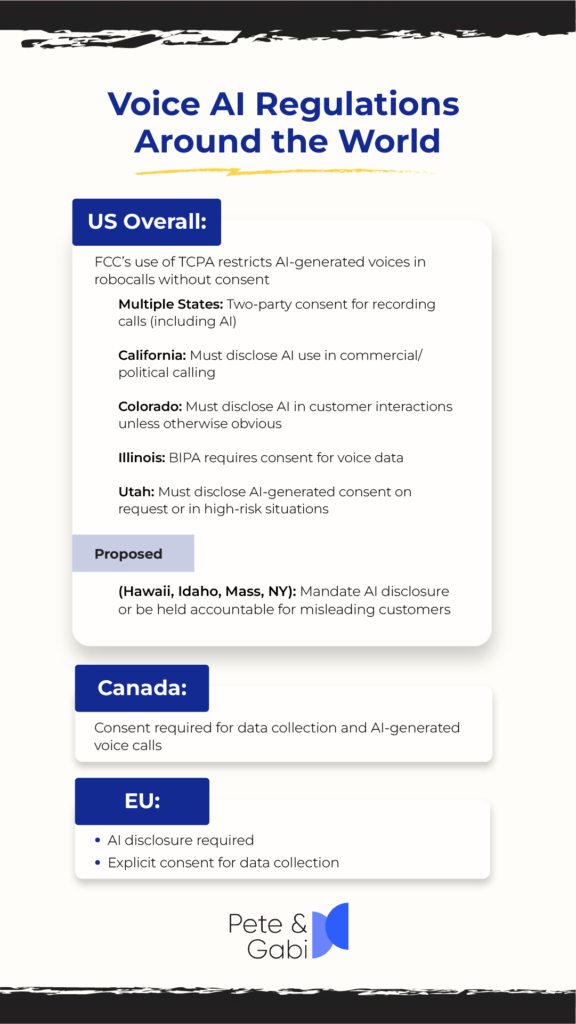
Sources here include: Marashlian & Donahue PLLC, the FCC, the Skadden Foundation, the IAPP, ISACA, and the Government of Canada.
Keeping up with it all is no small feat. And with over 40 state attorneys general acting to enforce existing consumer protection laws in AI cases, it’s not going to get easier any time soon.
Deploying AI in Customer Communication: The Must-Haves
To protect both business and customers, companies must demand more from their AI partners.
At the very least, all voice AI systems must enforce transparency by either directly acknowledging they are AI, or providing that information upon request, and without fail.
And it is best practice to always disclose AI involvement in customer interactions from the get go.
Customers must also be given a means of opting out and reaching a human agent.
For voice AI systems that do not enable live transfer, they must still provide some means of connecting customers or clients with human agents in a timely fashion.
All recordings, too, should be disclosed, especially if it’s being used for training or emotional conditioning of systems. This should be explicit with the purpose clearly noted.
AI agent boundaries should be reinforced with internal stress testing, rule-based limits, machine learning systems that improve AI behavior with experience, and regular monitoring of calls.
This includes checking across languages, accents, and dialects for bias and translation issues, feedback loops for improvement, and clear audit trails that provide transcripts and details of call outcomes.
And to assuage fears of voice cloning, consent must always be used before training models on call data.
Vetting Providers of AI Voice Agents
Any provider of an AI voice system should be willing and able to discuss the ways they maintain compliance and trust.
They should be knowledgeable of rules and regulations by region and have a means to ensure you aren’t violating these with cross-regional calling.
The following should be non-negotiable when implementing an AI system:
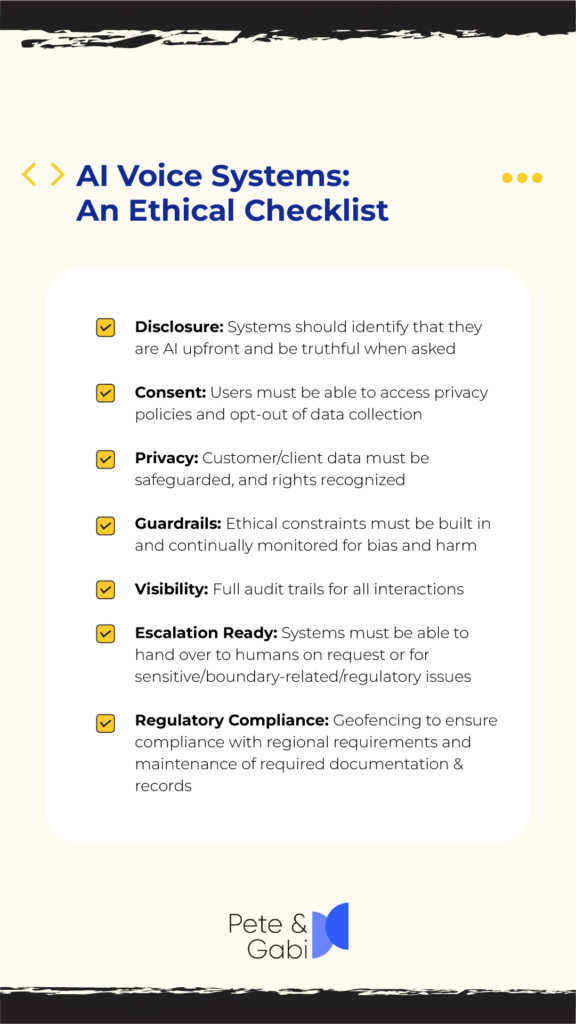
How Pete & Gabi Builds Ethical AI Voice Assistants
With Pete & Gabi, we built the system that we wanted. One that we felt was lacking.
Refined for more than four years on thousands of calls across industries, we devoted hundreds of hours of developer time and more than a million lines of code to getting it right.
And this includes ensuring the highest ethical standards are in use at all times.
This includes:
- Clear AI Disclosure: Every Pete & Gabi call begins with full transparency, indicating it is an AI-assisted call.
- Human Escalation Ready: At any point, a customer can ask to talk to a person and get immediately transferred to a live representative.
- AI-Guided Conversations, Not Robocalls: Pete & Gabi is engineered for meaningful engagement and respect, not mass robocalling.
- Call Etiquette: No customer is contacted more than once every 14 days, and calls are placed only during permissible hours (such as between 8AM and 8PM local time).
- Regional Compliance: We ensure our system remains aligned with TCPA enforcement, and FTC and FCC best practices.
- Geofenced: Our AI calls can exclude states with known restrictions or dynamically adjust to comply with state-by-state variations.
- Audit Ready: All interactions are recorded where legally permissible, and consent logs are timestamped. Companies have ready access to audio files, transcripts, and outcome summaries.
- Clear Documentation: Pete & Gabi provides its own AI compliance policy, access to internal compliance logs, and optional indemnification clause for additional legal protection.
- Respectful of Data Privacy and Consent: Pete & Gabi aligns with all major data privacy regulations, including CCPA, PIPEDA, and all applicable regional frameworks.

Conclusion: Ensuring Trust in AI Calls
At Pete & Gabi, we go beyond just meeting regulatory compliance.
Trust is essential to us, and we’ve built our system to safeguard your data, reputation, and customer relationships.
This is because ethical AI is more than just a compliance issue—it’s a mark of integrity and quality. We may currently be in a low-water mark for AI regulation, so by being proactive in providing transparent systems that ensure consumer trust, businesses not only demonstrate their leadership, they also prepare for a fast-moving future.
When you’re ready for the system that can do it all, check out Pete & Gabi.
Talk to Gabi right now at +1 224 445 2200
FAQs
Is it illegal to not tell customers they’re speaking with an AI over the phone?
This depends on the region, but yes, in some places it is. And all signs point to more joining in.
In other regions, it’s necessary that a truthful answer is given when prompted/asked, or that voices being used are fairly attributed and compensated.
We believe it is best practice to always disclose up front, as transparency builds trust, and a majority of customers across surveys indicate they prefer to know when they’re talking to AI.
Do customers really want to interact with AI phone agents?
Quality human agents are always the first choice.
But given an the option between waiting, using automated menus, or dealing with unknowledgeable or unhappy representatives, most customers would prefer AI.
AI voice agents used in this way improve the customer experience, provided they’re clearly disclosed and used ethically.
What’s the risk of AI voice agents being used for scams?
AI voice systems can be a vehicle for scam activity, and the risk continues to grow.
This is why it’s even more important that businesses be transparent and ethical with the delivery and implementation of their customer-facing AI, by disclosing its use, avoiding emotionally manipulative practices or language, and regularly monitoring their systems for effective behavior.



